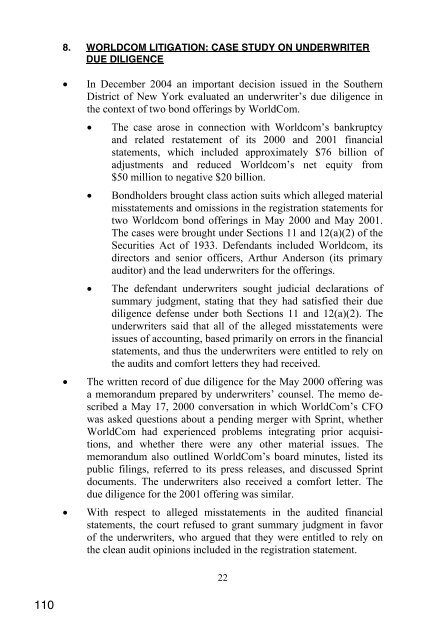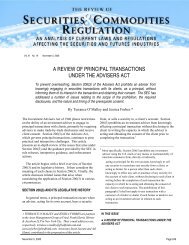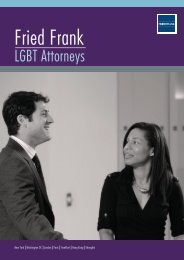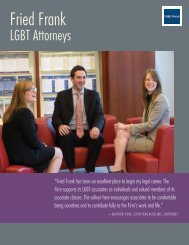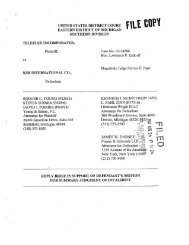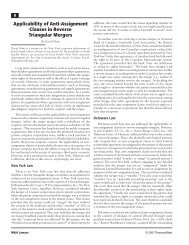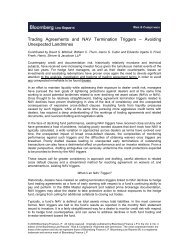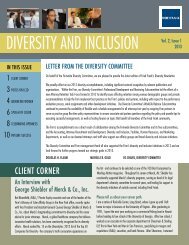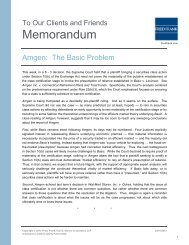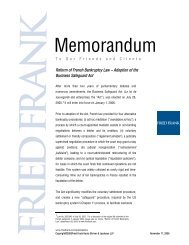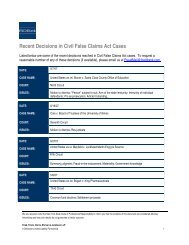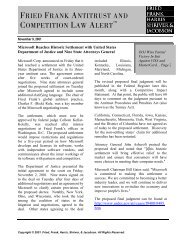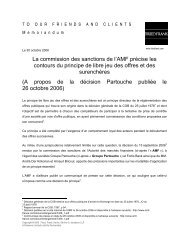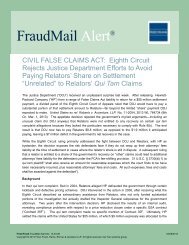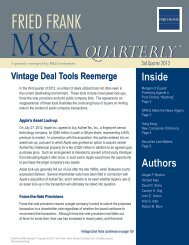The due diligence process from the underwriter's - Fried Frank
The due diligence process from the underwriter's - Fried Frank
The due diligence process from the underwriter's - Fried Frank
Create successful ePaper yourself
Turn your PDF publications into a flip-book with our unique Google optimized e-Paper software.
8. WORLDCOM LITIGATION: CASE STUDY ON UNDERWRITER<br />
DUE DILIGENCE<br />
• In December 2004 an important decision issued in <strong>the</strong> Sou<strong>the</strong>rn<br />
District of New York evaluated an underwriter’s <strong>due</strong> <strong>diligence</strong> in<br />
<strong>the</strong> context of two bond offerings by WorldCom.<br />
• <strong>The</strong> case arose in connection with Worldcom’s bankruptcy<br />
and related restatement of its 2000 and 2001 financial<br />
statements, which included approximately $76 billion of<br />
adjustments and reduced Worldcom’s net equity <strong>from</strong><br />
$50 million to negative $20 billion.<br />
• Bondholders brought class action suits which alleged material<br />
misstatements and omissions in <strong>the</strong> registration statements for<br />
two Worldcom bond offerings in May 2000 and May 2001.<br />
<strong>The</strong> cases were brought under Sections 11 and 12(a)(2) of <strong>the</strong><br />
Securities Act of 1933. Defendants included Worldcom, its<br />
directors and senior officers, Arthur Anderson (its primary<br />
auditor) and <strong>the</strong> lead underwriters for <strong>the</strong> offerings.<br />
• <strong>The</strong> defendant underwriters sought judicial declarations of<br />
summary judgment, stating that <strong>the</strong>y had satisfied <strong>the</strong>ir <strong>due</strong><br />
<strong>diligence</strong> defense under both Sections 11 and 12(a)(2). <strong>The</strong><br />
underwriters said that all of <strong>the</strong> alleged misstatements were<br />
issues of accounting, based primarily on errors in <strong>the</strong> financial<br />
statements, and thus <strong>the</strong> underwriters were entitled to rely on<br />
<strong>the</strong> audits and comfort letters <strong>the</strong>y had received.<br />
• <strong>The</strong> written record of <strong>due</strong> <strong>diligence</strong> for <strong>the</strong> May 2000 offering was<br />
a memorandum prepared by underwriters’ counsel. <strong>The</strong> memo described<br />
a May 17, 2000 conversation in which WorldCom’s CFO<br />
was asked questions about a pending merger with Sprint, whe<strong>the</strong>r<br />
WorldCom had experienced problems integrating prior acquisitions,<br />
and whe<strong>the</strong>r <strong>the</strong>re were any o<strong>the</strong>r material issues. <strong>The</strong><br />
memorandum also outlined WorldCom’s board minutes, listed its<br />
public filings, referred to its press releases, and discussed Sprint<br />
documents. <strong>The</strong> underwriters also received a comfort letter. <strong>The</strong><br />
<strong>due</strong> <strong>diligence</strong> for <strong>the</strong> 2001 offering was similar.<br />
• With respect to alleged misstatements in <strong>the</strong> audited financial<br />
statements, <strong>the</strong> court refused to grant summary judgment in favor<br />
of <strong>the</strong> underwriters, who argued that <strong>the</strong>y were entitled to rely on<br />
<strong>the</strong> clean audit opinions included in <strong>the</strong> registration statement.<br />
22<br />
110


